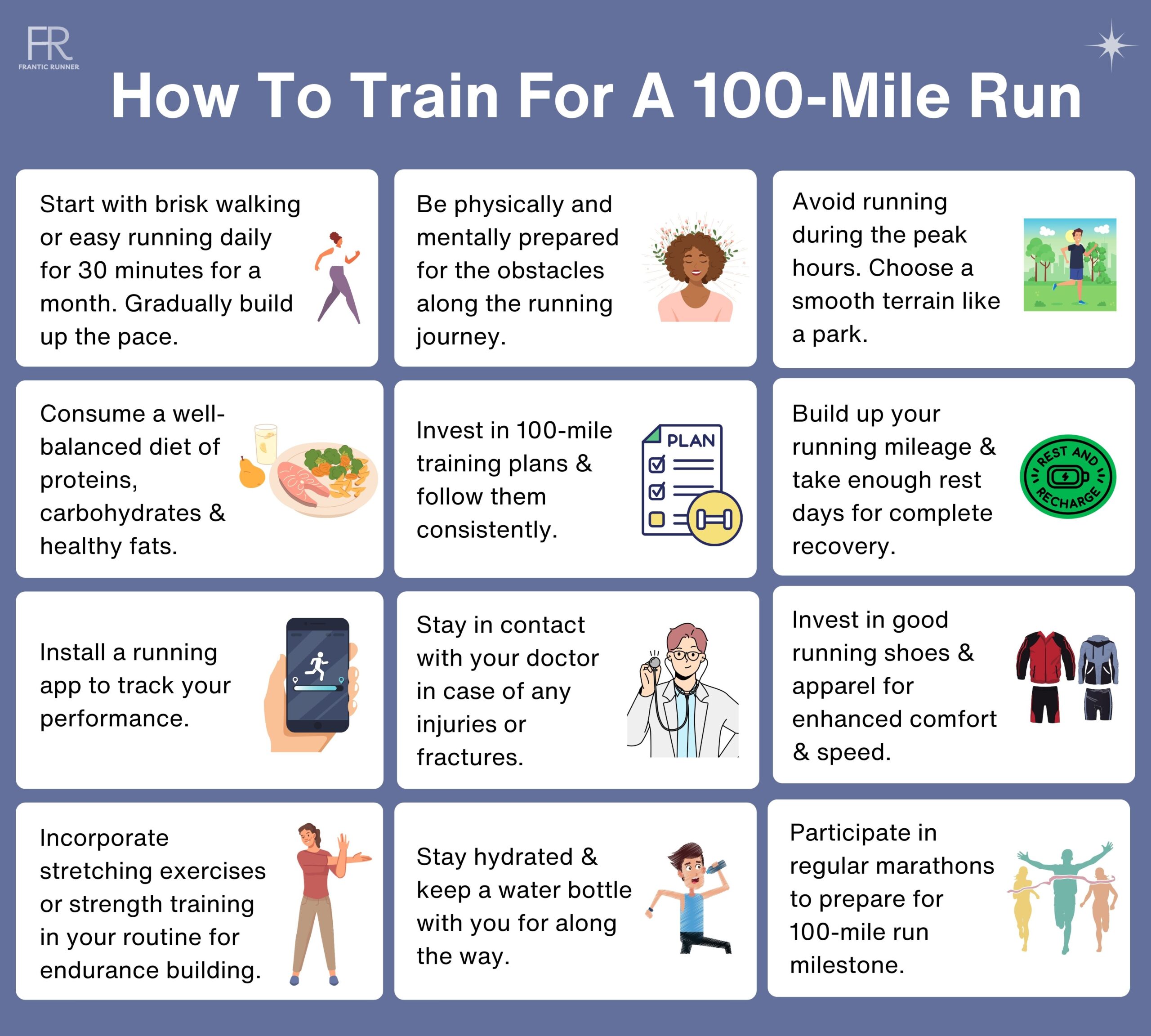How To Train For A 100 Mile Run? (A Step-by-Step Guide)
Going after a 100-mile baseline is no joke. But if you need a sense of accomplishment and pride, don’t look away from the long road ahead.
100 miles can be a daunting run but nobody said you should go after the target in one run. If you do so, your hamstrings and quadriceps will cry for help, and no song can give you a boost — I’ve been there.
So the answer to the question of how to train for a 100-mile run is to first get motivated. Hire a running coach, stay hydrated, and have well-balanced meals. Focus on cross-training like yoga or biking. Begin with 18 miles a week and then gradually increase the miles. Runners with higher mileage will easily achieve a range of upto 110 miles, supplemented by activities like hiking on the side.
But when I added cross-training to the regiment with the right running gear, I could go 18 miles per week. With such a pace, I was able to finish the 100-mile bar by week 6. So, come on board for a step-by-step guide on how to train for a 100 mile run
Training For A 100-Mile Run
Let’s be honest, ‘100’ sounds unearthly. And going without a plan or a promise is not going to get you near the mark. In my experience, I’ve had too many bathroom breaks, barfing, and food poisoning. Stick around for how to train for a 100-mile run for beginners.
I’ve taken on lengthy, rocky runs but 100-mile training was too much. Where did I go wrong? Planning. I had no plan, and that’s where it all fell apart. Don’t be like me. Be better, and give your 100 mile-run the love and respect it deserves.
| Miles | Calories Burned (for 125 lbs. weight) |
|---|---|
| 1 | 100 |
| 2 | 200 |
| 3 | 300 |
| 4 | 400 |
| 5 | 500 |
| 6 | 600 |
| 7 | 700 |
| 8 | 800 |
| 9 | 900 |
| 10 | 1000 |
| Miles | Calories Burned (for 175 lbs. weight) |
|---|---|
| 1 | 115 |
| 2 | 230 |
| 3 | 345 |
| 4 | 460 |
| 5 | 575 |
| 6 | 690 |
| 7 | 805 |
| 8 | 920 |
| 9 | 1035 |
| 10 | 1150 |
How To Train For 100 Miles (Step-By-Step Guide)
Here’s the step-by-step guide to making a good 100-mile training plan for beginners:
1. Humble Beginnings
Start slow and steady and gradually pick up the pace. Go for a brisk walk for 30 minutes, pick up slowly but surely. You don’t want to tire out early by running faster in the beginning. So go easy on your stamina and leg muscles by running for 3-4 weeks.
Related Article: “Why Is Running So Hard For Me? (15 Easy Tips For Beginners)“
2. Don’t Start At Peak Hours
Try to avoid rush hours and traffic. You need a clean and clear route to start running. So, if you want to become one of the most professional trail runners, go early in the morning or at night.
Related Article: “Running With Or Against Traffic? (+7 Tips For Road Safety)“
3. Eat Your Veggies
For runners, getting 60% to 70% of your calories from carbohydrates is recommended. The rest of your calories should come from lean protein and healthy fats, with each making up about 15% to 20% of your diet.
Related Article: “Does Running Burn Belly Fat And Love Handles? (5 Easy Tips)”
4. Be Consistent
Stay the course, and be consistent about it. You’re enroute to finish the course, so know your endurance base and stick with it.
5. Plan
You can never finish the run without a plan. It doesn’t matter if you have just started running. Your goal should be to have 100-mile ultramarathon training plans and to prepare yourself, both mentally and physically.
6. Manifest Polarized Training Model
Are you ready to run 100 miles? Think again. Building a strong aerobic capacity and endurance is important for ultra-distance races like 100 miles.
7. Work On Your Performance
If there’s one thing runners despise, it’s serious injuries like sprained ankles and Achilles tendinitis. So, to work on your weekly mileage and performance, get enough rest days. Also, know that your speed varies based on your gender.
A study conducted in 2022 showed that men run 10% to 12% faster than women
8. Focus On Your Effort Rather Than Pace
Work on getting your set to the pavement and moving. If you need a boost for the run day, work on sessions like fartlek and training runs. Be careful because fifty percent of injuries among athletes come from running.
9. Install An App For Running
To stay focused, you can download an running app like Runkeeper. It is a GPS-based running app that keeps you alert for your 100 mile race and running routine.
10. Be Prepared Physically And Mentally
Runners are likely to stumble on a root or hit a wall, it happens. So, it’s better to have your body and mind.
A recent study found that men have their peak running performance at age 37, while women have their best at 39.
11. Try Short Races
If you are a beginner runner, you shouldn’t pick up on a 100-mile run on the first try. Instead go for shorter races, and brisk walks, and if that’s alright, try a regular marathon (13.1 miles). Gradually get the feel of running in your legs and lungs, and then only you will be ready for a 100-mile run.
Related Article: “How Long Does It Take To Run 7 Miles? [The Ultimate Guide]“
12. Contact Your Doctor
Running could mean injuries and joint fractures if you’re doing too much of it. That’s why stay in contact with your doctor or a medical practitioner.
Related Article: “Can You Run With A Broken Toe? (Research And Evidence-Based)“
13. Have A Long-Run Strategy
To accomplish a 100-mile run without an aid station, focus on your recovery time, intensity, terrain, and consecutive runs. For example, if running 30-35k trains you for a 42k race. Then, you’d have to run over 70k for a 100k race, and more than 120k for a 100-mile race, using the same concept for long-distance ultras. This is just too much!
Related Article: “Long Distance Running Vs Sprinting (7 In-Depth Comparisons)”
14. Try Different Routes
100 miles could mean a variety of routes and terrains like muddy, rocky trails, etc.
Related Article: “9 Best Shoes For Mud Runs (Tested By Experts)“
If you are working on a short run, you should switch routes now and then. And also try cross-training like hiking and cycling for better endurance. Make sure to take the right steps on how long to train for a 100-mile run.
15. Get Good Running Gear
A 100-mile run is a huge expedition to take on. And going solo can be very difficult. So, it’s wise to invest in running gear like a running jacket and shorts. But most importantly running shoes that offer a comfortable and lightweight experience for the race day and prevent injuries.
Related Article: “9 Best Lightweight Running Jacket (Tried & Tested)”
Research has shown that carbon plated shoes have multiple benefits on running performance.
Related Article: “7 Best carbon-Plated Running Shoes (Tested By Runners)“
13 Amazing Benefits Of Running 100 Miles
Running in particular is beneficial for your mind, soul, and body. If you’re feeling low, running can lighten up your mood. And if you want that peak physique, count on the steps you take on running.
Related Article: “13 Astonishing Benefits Of Running 3 Times A Week”
Here are some of the most outstanding benefits of running 100 miles:
1. Reduced Risk Of Heart Disease
Pursuing a 100 miler can enhance your cardiovascular health by lowering blood pressure, reducing cholesterol levels, and improving heart functionality.
2. Reduces Stress And Anxiety
A good 30 minutes of running can produce endorphins which help in reducing anxiety and depression disorders. So, go for a nice run, and work your calf muscles with strength training.
3. Increase Life Expectancy
Running in particular increases your life expectancy by three years!
4. Increased VO2 max
Endurance training from running long distances improves VO2 max, the oxygen capacity the body can utilize during intense exercise, enhancing overall aerobic capacity.
5. Enhanced Muscle Endurance
Long-distance running strengthens slow-twitch muscle fibers improving muscle endurance. It also delays fatigue during prolonged physical activity.
Related Article: “Will Running Lose Or Build Muscle? (11 Ways to Prevent It)”
6. Burns Calories Instantly
On average a 30-minute run can burn 280 to 520 calories. So lace up, pace up, and shake the fat off your body.
Related Article: “5 Amusing Facts For Runners Being so Skinny (Expert’s View)”
7. Improves Your Joints
Getting your legs and lungs through a regular run can improve your joint health. And prevents the risk of osteoarthritis and inflammation.
8. Strengthens Your Bones
It doesn’t matter how far the finish line is. But a nice run around the town could save you from osteoporosis and fractures around the hips and spine.
Related Article: “Is Running Bad For Scoliosis? (Expert’s Insight)”
9. Better Mental Health
Running can improve your mental capacity and get you survivor-ready for difficult tasks.
10. Better Immune System
Getting a good run everyday (say 10 miles) can boost the production of immune cells in the leukocytes which can save you from infections.
11. Social Connections
Once you are on the route to run, you make friends that help, and become part of an awesome community
12. Sense Of Accomplishment
Finishing long runs like 100 miles is amazing! It makes you feel proud and confident, helps you restore the long-lost faith in you, and makes you believe you can do anything.
13. Makes You Confident
Running reduces anxiety and builds self-esteem. And that’s what made me run regularly.
| Distance Covered (miles) | Benefits |
|---|---|
| 10 | Running 10 miles strengthens endurance, muscles, and mental resilience while burning calories and reducing stress. |
| 20 | Improved cardiovascular health, better hamstrings, and lower risk of chronic diseases. |
| 30 | Increased longevity, improved cardiovascular health, weight loss, boosted immune system, improved sleep quality. |
| 40 | Relieves stress and improves mental health, increased bone density, reduced risk of cancer, builds muscular strength. |
| 50 | 50 milers have better stamina and balanced blood flow. |
| 60 | Great opportunity for adventure seekers. Improves blood flow to the body. |
| 70 | Increase in endorphins and join fluids for better mood and functionality. |
| 80 | Clears your lungs, and builds up better blood flow. |
| 90 | Helps in burning an insane number of calories, and balances peak physique. And helps sleep better at night. |
| 100 | Decrease in body weight, muscle mass, and increase in endorphins that make you feel happy and mentally alert. |
What Is The Running Requirement For You?
Here’s a condensed breakdown of how much you should run daily, based on your age:
| Age Group | Running Requirement |
|---|---|
| 10-20 years | At least 1 hour of medium to vigorous intensity activity. |
| 20-30 years | At least 1.5 hours of medium to intense aerobic activity. |
| 30-40 years | At least 1.5 hours of medium to intense aerobic activity. |
| 40-50 years | At least 1.5 hours of medium to intense aerobic activity. |
| 50-60 years | At least 1.5 hours of medium to intense aerobic activity. |
| 60-70 years | At least 1.5 hours of medium to intense aerobic activity |
| 70-80 years | At least 1.5 hours of medium to intense aerobic activity. |
| 80+ years | At least 1.5 hours of medium to intense aerobic activity. |
Conclusion
Going after a 100-mile mark can be hard and impossible for runners with no plan or preparation. If you’re new to running, you should take it easy. Make sure that training for a 100 mile run pays off well.
Running for soo many miles daily requires high quality running apparel and gear to support you through your journey, Check out our article on “11 Best Running Shirts For Heavy Sweaters (Runner’s Opinion)“
If you want to train physically and mentally, do check out Ultrarunning for Normal People: Life Lessons Learned On and Off the Trail by Sid Garza-Hillman.
Frequently Asked Questions (FAQs)
Training for a 100-mile race usually needs at least 9 hours a week for 6 weeks, starting 9 weeks before the race. This sets a reference point for success and makes you prepared for the distance.
Start with 18 miles a week. Slowly increase to a peak of 55, averaging around 40 miles weekly for most weeks. Individuals with higher mileage can achieve a range of up to 110 miles, with an average of around 70 miles, supplemented by cross-training and hiking on designated days.
For a 100-mile race, one should find motivated. Hire a running coach, and get the right nutrients. Focus on your feet, work on cross-training like biking or yoga, and get a nice feel of the route. Make sure you get enough sleep. Two days of the week before your 100-mile event. Also, a supportive crew is nice and tries to plan with an objective



